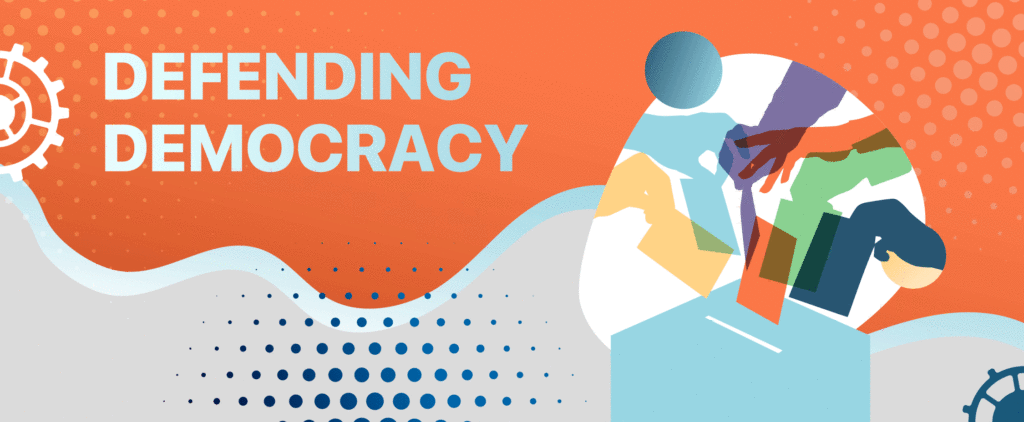PIT & Defending Democracy
Defending Democracy
November, 2023

Author: Allison Price is a senior advisor with the Digital Impact and Governance Initiative (DIGI) at New America. The DIGI team supports the development of the next generation of technology platforms to transform the way governments deliver value and better outcomes through research and collaborative pilot projects designed to address some of the world’s most persistent challenges like transparency, identity and corruption.
What is Public Interest Technology?
5 Keys to Institutionalizing PIT
What is PIT-UN?
Introducing the November 2023 PIT UNiverse Newsletter
Technology and democracy are intrinsically intertwined. In our evermore technological world, it’s essential that we develop governance models for digital systems, uphold ethical standards and respect the will of the people. The Digital Impact and Governance Initiation (DIGI) team at New America works to catalyze next generation systems and solutions powering the field of digital public infrastructure through cross-sector collaboration. Complementary to the PIT framework, DIGI’s mission is driven by the need to put people at the center of solutions, using tech as a tool to strengthen trust, justice, and access measures. We believe it will take a robust and global collaborative effort to bolster a sustainable and inclusive digital future.
This issue of PITUNiverse is dedicated to a particularly urgent topic, defending democracy. Too often this field is fractured by several subjective divides ranging from domestic considerations, global challenges, geopolitical leanings, the lack of incentives and resources for collaboration, What’s more, despite civil society organizations efforts at reform, the public is often willing accept the terms and trade-offs of big tech’s business models.
But a cohesive, global perspective going into 2024 is critical. 40 countries are headed to the polls, millions of votes will be cast across India, Indonesia, Mexico, Taiwan, and the United States to name just a few. We are already getting a preview of AI’s use in generating content, ranging from advocacy for specific candidates to nefarious activities like deepfakes, in elections in Argentina and Slovakia. Democracy will undoubtedly be tested by known risks and emerging threats that too often fracture both the will and expectations of the people.
Even before the advent of accessible Generative AI tools, people had been questioning elections, unsure if their votes were counted or if their voices mattered. But the practice of democracy extends far beyond electoral politics. Democracy includes the flow of public health and safety information, access to government benefits, passing through a security checkpoint, or checking the status of a loan application. Public interest technology includes digital service delivery ecosystems and partners such as Code for America, Govern for America, the Digital Corps, Coding if Forward, Tech to Gov, and many others working to ensure that we use technology to protect and advance the day-to-day of democracy.
For democracy to thrive, people must experience public services that are responsive to their needs and respectful of their rights. This requires upstream interventions that extend beyond the realms of voting and public policy, a challenge that public interest technology is uniquely suited to. Because technology has become so central to all aspects of life, we must ensure that a more diverse group of stakeholders is involved in its design, deployment and governance from start to finish.
It is with this lens we share with you the following stories from the field about advancing efforts to defend democracy through initiatives across the Public Interest Technology University Network.
PIT Pathways to Public Service
Many people enter undergrad or law school seeking impact through careers in government or public service. But how long will public service pursuits be a desired career path when the government seems ineffective and untrustworthy? For some, the government doesn’t feel safe. Measured interventions can be taken to leverage tech and innovation to strengthen our communities and our democracy in a way that is inclusive of life experiences.
Laura Bingham, PIT-UN Grantee at Temple Law School, works to introduce students to the possibilities of pursuing PIT Law in industry, government and non-profit work. In PIT Law: Forging a Just Technological Future Bingham explores intersections of Public Interest Technology and Public Interest Law: “both law and technology are powerful tools built by humans to improve human life; however, as professions they are also both inaccessible to most people even as they hold immense sway over societies and profoundly impact democratic institutions.”
The intense and burgeoning interest among students and practitioners to delve into the critical challenges of our time, from bias in data to big tech business models, is a testament to the urgency of our mission. There is a clear interest in multi-stakeholder engagement that is inclusive of the perspectives of public and private sector expertise. We must help facilitate these conversations and illuminate career pathways and opportunities to fortify democracy, strengthen institutions, enhance access to public goods, and champion justice.
Data, Ethics & Democracy
I was immediately drawn to Making Data Science Democratic by Dr. Amy Yeboah Quarkume, (affectionately known as Dr. A) at Howard University, where she serves as an Associate Professor and an interdisciplinary scholar of Africana Studies, Data Science, and Environmental Justice.
The intersection of data and ethics is vast. Earlier this year, DIGI hosted a challenge about ethics and compiled findings in Guiding Principles for Technologists Could Bolster an Inclusive Digital Future with four PIT-UN member institutions. In her piece, Dr. A shares the guiding principles of the CORE Futures Lab she directs at Howard, and describes ambitious community-centered projects that collect heat, water and air quality data in Black, Brown and Native American communities, compare that data against federal reporting, and help communities articulate how they would like to address the considerable gaps in the data.
Dr. A’s work empowers students to collect, critically analyze, and ethically deploy data in ways that uphold democratic ideals for all, reminding us that data science is a human practice, shaped by human interests. “Data, often perceived as an objective reflection of reality in its purest form, is inevitably shaped by the subjective human elements that influence its collection, interpretation, and application. In a democratic context, it’s imperative for data to mirror the multifaceted dimensions of society, capturing the intricacies of diverse demographics.”
Opportunities & Challenges of AI Governance
Questions around tech governance and oversight have been amplified by the rapid pace of AI development and the lack of enforceable guard rails. Widely accessible Generative AI tools have proven to be true “dual use technologies,” with equal potential to do good and cause harm. They have shown promise in driving social impact across sectors, serving workers in education, small businesses, and healthcare; and can rapidly spin out highly credible but factually dubious digital content. The possibilities are fantastic and terrifying to consider. Now is the time to incentivize AI developers to align these tools with civil and human rights, and legal norms to ensure the safe and beneficial uses of AI.
Margaret Hu of William & Mary Law School and our DIGI/PIT colleague Alberto Rodriguez-Alvarez analyze the promising Executive Order on the Safe, Secure, and Trustworthy Development and Use of AI issued by the Biden Administration in their piece AI’s Next Chapter: The EO & Academia’s Role in the Future of AI. While the EO shows a clear willingness of the federal government to take a role in protecting human and civil rights in the age of AI, there is still a lot of work ahead, and academia has a key role to play. The two conclude that with coordinated efforts across government, academia, and industry, we can harness AI’s immense benefits while safeguarding our democratic values and ensuring a future where technology serves the public interest.
In Shaping Ethical Technologists in the Age of AI, Dr. Denise Ferebee of Rust College describes how she helps young technologists understand the unintended consequences of automated decision making systems by focusing on coding for specificity. “You cannot be ambiguous when writing code, lest your program will end up delivering outputs you did not anticipate. While no program or application will account for all the harmful possibilities, we do need to make sure that at the very least the predictable harmful possibilities are not ‘baked in’ from the beginning.” Professor Ferebee, as part of a 2022 Network Challenge Grant involving Lemoyne-Owen College, Stillman College, Rust College, Lipscomb University and Union University, created a workbook for faculty and students interested in learning more about PIT through classroom learning and research projects.
Preparing for 2024 and Beyond
Rather than bracing for impact, let’s redouble our collective endeavors to strengthen the communities we serve. When we can use our phones to access the latest news, consumer goods, and dance crazes, but not government services – and without knowing if and how our data are being collected and deployed in the process – it’s clear that the values driving technology are not aligned with the public interest. This is where we need to focus.
Technology is a vital tool for governments to address persistent societal challenges at scale. It can be harnessed to defend democracy, and even help create thriving democracies; it just needs some concerted renovation efforts by a mobilized PIT community.

